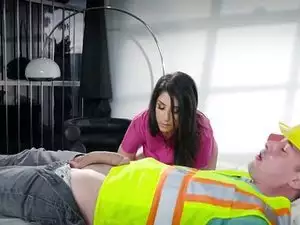The Three Signs - Book 4 - LisaChapter 3: Good Fences, Good Neighbours free porn video

“I guess you didn’t see what was in yesterday’s Sydney newspapers, did you?” Mary Beth asked when I came to breakfast.
I shook my head.
“There was another fatal accident on the Parkway, close to where Janelle was killed; this one was just a single vehicle accident. Driver and passenger both killed. Yet another white panel van, but the driver was a middle aged man, the passenger a young girl. Happened late on Thursday night; no details of the victims yet. Police don’t know what caused it, but they suspect the driver just lost control of the vehicle, or something like that.”
There was something about what Mary Beth said, made me pay attention. I might need to talk with Allison, see if she could refresh my memory about what Jillian had told us last year.
“Strange how the accidents there always seem to involve while panel vans,” she continued. “It’s like there’s a strange supernatural attraction for those vehicles there.”
If only she knew the full story, I thought to myself.
“Interesting,” I said. “I guess there will be full details out soon, but that’s a dangerous stretch of road. You know Ian Craig is coming around after lunch, and Chris and Paul Ramos will be here, too. We’re going to talk about the building work, at least the stuff that will be starting in the yard this week.”
“So it’s only the front fence and path they will be working on this week?” she asked.
“Yeah. Next week they plan on doing the driveway and gates, plus starting on the rotted wood around that front awning and windows,” I said. “I think we’ll have to load the trailer for the Millers’ gigs next Monday, so they can start on the driveway concrete Tuesday. But we’ll learn more when they are here later today.”
I found Saturday’s copy of the Sydney Morning Herald, flicked through the pages until I found the article on the accident Mary Beth was referring to. There was something about the report that seemed unusual; from what I recall Jillian saying, a lot of those accidents were caused by the vengeful spirit of the teenage girl who was raped and murdered. But she would not be in the car when the actual impact occurred. I tore out a copy of the news report, and I would talk about it with Allison. Jillian did mention something about a plan she and some of the other guardians were working on ... maybe they managed to finally get rid of the vengeful ghost?
I looked at the copy of the approved plans for the work on the house that Ian had prepared; last week he got them fully approved by the Lane Cove Council. He said once he showed the heritage and conservation committee copies of some old photos of the house, showing the original appearance, and that his plans were to restore the house to the original appearance and style, at least as much as was physically possible, there was no problems with the approvals.
Although his plans included restoring the original roof, with access to the attic, and also to the basement, we weren’t doing that work in the initial stage. The front fence was the main initial task, that and upgrading the driveway with decent gates and new garage doors. The driveway gates would be motorised and there would be motors to raise and lower the garage doors. All quite fancy, I thought.
Just after lunchtime the Ramos brothers arrived, in the back of their utility were a stack of timbers and other materials. Ian arrived at the same time; with some large plans and blueprints. We helped unload the materials; Paul told us to move things in the garage.
“These three by four’s are the fence rails,” he said, pointing to one stack of timber. “We will need to get them painted before they will go between the columns. Will, do you have a belt sander?”
I nodded.
“If you do each side with some coarse grit paper, say, 50 or 80 grit, just to smooth any splinters off them. They don’t have to be perfectly smooth, just nothing to catch fingers and that on. If you have a router with a small concave bit, maybe just take the corners off down the length of each side, too.
“Then they need painting, a coat of the pink primer, then the undercoat, and finally the white gloss. I’ve got the paint tins over here. That can be started this arvo, I reckon. It will be easier to paint the rails before we put them up, that way we don’t have to worry about getting paint on the brickwork.
“Now, tomorrow morning a guy will be coming around with the big waste bin, we’ve got it for two weeks, so if you want to pull all that lantana out from the back and dump it in, go ahead. Tomorrow morning we’ll pull the old fence out, and I’ll have a little bobcat that we can use to dig the new foundation areas, plus clear the old concrete path. We’ll form the reinforcing, get them into the holes, and we will bring a small mixer to make the concrete to pour there as well. The bricks for the fence posts, plus all the pavers should be delivered sometime tomorrow.”
With the schedule discussion over, Ian started to measure up and mark areas on the front lawn, where the grass would be dug out, and where each column would be. He then marked where the front path would go, once the old one had been removed. It looked like everything was in train for the work to start first thing tomorrow morning.
I backed my car out of the garage, and set up some trestles so I could prepare the fence rails. With Fiona and Mary Beth helping, we had a production line going; I would first round off each edge with the router, then use the sander to smooth each side. Fiona used an old vacuum cleaner to get all of the dust from the wood, and Mary Beth used a small paint roller to cover two sides of each rail with the pink primer. Once I had finished the sanding, I then started on painting, turning the wood over to do the remaining sides.
It didn’t take us too long to have all of the rails painted; Paul had said not to bother with painting the other pieces of timber, as they would have to be cut to form the entrance over the gates.
“I think it’s going to be a busy week or two,” Mary Beth said. “Three nights at Miller’s Brighton this week, and Manly Vale next week, as well as all the work here at the house.”
“I’m not expecting any of you to help out,” I said. “I appreciate it, but you’re on holidays.”
“We want to help with the work,” Fiona said. “Besides, it’s fun, and make me feel like I’m achieving something.”
“Well, thank you both, anyway,” I said.
We cleaned up the paint rollers, and made sure the rails were secure on the trestles, and headed back inside. That was pretty much all we could do this afternoon, so we went inside, cleaned up, and cooked dinner.
Paul and Chris’s work crew arrived early in the morning, they had a large flatbed truck, towing a trailer loaded with sand and gravel. Behind Paul’s ute was a small cement mixer, they quickly had everything set up on the front lawn, dumping the gravel and sand in two big piles next to the mixer. We ran an extension cable from the garage to power the mixer, and some hoses for water to mix the concrete. On the truck was a small excavator with heavy rubber tracks, almost like a bobcat, but smaller. It was designed for someone to stand on the back, rather than sit inside in a small cab, but it had a big scoop at the front, and an extensible arm with a big auger fitted to it.
They started pulling down the old steel fence; first the remnants of the wire mesh were pulled off, then with a huge petrol powered hack saw, started cutting through the metal pipes that made the fence frame. They use the little excavator to help pull the pipes from the ground, they had been set in concrete, and there was no way one person, or even two would have been able to pull them out unassisted.
Meanwhile, the rubbish disposal people had arrived and dropped off the large bin, which was sitting on the nature strip, and the remains of the old fence were dumped into it. The next task was to remove the top layer of grass along the fence line to make what will become a planting bed, and to dig the holes for the foundation for each brick column. Chris made short work of that with the excavator. Meanwhile, one of the other guys, Rocco, started fabricating the reinforcing mesh boxes that would sit in each hole; with a large pair of boltcutters he cut the mesh to size, bent it in right angles, and tied the pieces together with some special twist ties.
As each reinforcing box was completed, Paul and Ian set them in the holes, checked them for level and alignment along the fence line. I was assisting Branco at the concrete mixer, putting in shovel loads of sand and aggregate, then we would dump in a bag of cement, and once the dry components were mixed properly, he would add water until he felt the consistency was right. As a load was ready, we would empty the mixer into a barrow, and Branco would take to that to one of the holes, dump the concrete in around the reinforcing, where Paul would tamp it down, level it, and make sure it was at the correct height. Meanwhile I would put more materials into the mixer for the next batch. It was good, hard manual labour, but quite satisfying to see things start to take shape. By mid-morning – ‘smoko’ time, we had half of the foundations done.
Fiona had been putting the next coat of paint on the wooden rails; she went inside to help Mary Beth bring out cups of tea and cold drinks for us. We sat in the shade on the front veranda, as it was already getting hot.
“They will be ready for us to start laying the bricks tomorrow morning,” Paul said. “They should be delivered sometime today. We should have all of the foundations done by lunchtime, the concrete will be set by the morning.”
“What’s next for today, Boss, after we finished the footings?” Branco asked.
“Chris will dig up that old front path, and level the ground so we can prepare for the pavers,” Paul said. “After lunch, we can get the gravel down, and the sand, put the footing in for the arbour running from the front gate to the steps.”
We finished our drinks, and the break was over. Old habits die hard, of course, for years, the mid-morning and mid-afternoon breaks were called ‘smoko’ – a break to have a smoke. Even though none of the workers smoked, they still called it smoko. By lunchtime we had the footings completed, and in the afternoon we prepared the base for the front path. Fiona and I painted the arbour uprights and beams with the primer; these would go up once the pavers had been laid.
We had the day’s work done by 3:30; Paul’s guys packed up their equipment, and headed home. Fiona and I finished off some more painting that evening, the fence rails would be ready to be installed tomorrow once the paint had dried.
When the others arrived at the house for the start of work, Paul was pissed off; the bricks hadn’t been delivered as promised.
“Will, can I use your phone?” he asked.
I showed him where the phone was, he pulled out a piece of paper from his folder, and dialled the number.
“Muzza,” he said to the person who answered, ‘I’m here at the job site in Lane Cove, and guess what? There’s no fucking bricks or pavers. You said they would be here ready for me to start work on the thirteenth, and there’s nothing here. I’ve got a bunch of brickies hanging around like spare dicks at a wedding, and I’m not happy!”
The person at the other end of the line, Muzza, I assumed, said something to him.
“Yeah, well, I don’t care what your problems are, I need those bricks and pavers, like this morning. If you can get the pallets of the dark purple face bricks, one of the lot of pavers, and the quarter round edge bricks, by lunchtime today ... that means here, on site and unloaded by eleven thirty, not bloody three this arvo.
More talking from Muzza.
“Okay; I chose you for this job because you said you could deliver on time, don’t make me regret my decision. I’ll see you when you bring them round.”
He hung up the phone, and sighed.
“Fucking suppliers, you’ve always got to ride them hard, or they’ll try to cheat you somehow. There’s not much we can do until those bricks arrive, I guess we can start on the arbour. The paint should be dry, shouldn’t it?”
The framework of the arbour went up quickly; each vertical piece was screwed into the little saddle that was tied to the footing, and there were long beams tying each vertical together. The final section couldn’t be attached until the gateposts were in place, but when it was done, it defined the entrance to the house.
“Shows just how much I need to paint the house,” I said to Ian.
“Yes, and when we redo the veranda supports, we will have corbels at the top of the posts that will visually match the style of the arbour,” he said. “Eventually, when we replace the roof, and restore it to the original design, that motif will be reflected in that as well.”
As we were looking at our work, a truck arrived with the missing bricks and pavers. We worked to get them unloaded and stacked up on the job site; Paul and Chris spoke to the guy delivering them, who I assumed was ‘Muzza’. Meanwhile, Rocco ran a pair of string lines along the length of where the fence posts would be.
With the bricks stacked up, we started to lay the bricks for each column. Branco was on the mixer, this time mixing ‘mud’, the mortar that would be use to cement the bricks together, and Chris and Rocco would be laying bricks. I watched as the two of them worked, one to a column, and tried to keep up a supply of bricks to them. Rocco was the faster bricklayer; it was amazing watching him work. He had a large triangular trowel that he would use to lay a bed of mortar down, spread it evenly over the previous row, then put a piece of mortar on the end of the brick, and set it in the mortar. He would use the butt of his trowel to set it firmly in place, then move to the next brick. As each row was done, he would check levels and alignment, and clean off the excess mortar with a wet sponge.
“You want to have a go, Will?” he asked me, handing me his trowel. “You want to make sure the bricks are wet, so put some in the water bucket. Otherwise, they will suck all the moisture out of the mortar, and it won’t set properly, and be all crumbly.”
I managed to get a row laid, taking maybe three times longer than he did, but at least they were level and plumb.
“Not too bad, we’ll make a brickie out of you yet!”
When we had finished a row, he used a small aluminium scraper to set the groove along the mortar line, and then wiped the excess mortar from the face of the bricks with a wet sponge. The column was starting to take shape, and looked the way it should.
Once each column was about a foot off the ground, we placed the lower rail in position, then continued laying bricks. The second rail went in two rows higher, and then after another row, he started on the top cap. By the time we broke for lunch, two of the columns were done. When we finished lunch, another of the Ramos brother’s trucks arrived, containing two more of their bricklayers, and we managed to get all of the fence complete by knock-off time. The edging for the new front path was also laid; bricks that were rounded along the main length, these were ones Paul called the “quadrant” bricks. Once the mortar holding them set, we would be able to prepare the base for the pathway to prevent the grass from growing over the path. That was the problem with the old front path, over the years it had become cracked and overgrown with weeds and grass to the point where unless you knew it was there, the concrete was completely invisible.
Once the workers had left for the day, I walked across the street to see how everything looked. Even though the front gate hadn’t been hung, and the final section of the arbour, the part over the front gate was still to be put up, it looked so much better than how it had looked before. That rusted, tumble down mesh fence was an eyesore; the new fence had clean lines, and once some flowering shrubs had been planted, it would be very attractive. It did show just how run down the front of the house was, at least next week the old awning would be removed, and the front bay window replaced. As well, the timbers supporting the roof over the front veranda would be replaced. The house was starting to regain more of its original beauty.
Thursday was paving day; they started spreading a layer of fine crushed gravel, it looked like blue metal road base. Once it was level, they used a petrol powered whacker – at least that’s what I called it. Phil called it the ‘plate compactor’, he worked it slowly across the whole path, compacting the gravel into a nice, solid base. Then there was a layer of sand, to bring the base for the pavers up so the top of them would be at to the right level.
Ian and Celia had worked out a pattern for the pavers that appeared a traditional pattern, against the edge there would be a single row of pavers laid lengthways, and filling the main part of the path was a herringbone pattern. The edge pavers were the dark purple brick to match the bricks on the house, while the ones used for the herringbone infill had a variation of dark reds. Using the herringbone pattern required the bricks to be cut at a forty-five degree angle where they met the side rows, but they used a handheld circular saw with a cutting wheel to shape the bricks to fit.
The pavers were set in place using a large rubber mallet to whack them down into the bedding sand; once some had been set, we shovelled more sand, this time mixed with some cement powder over them. After a final going over with the plate compactor, the pavers were well and truly locked into place. We gave the finished path a light hosing with water, to help set the concrete and sand mix, swept the remaining sand away, and the path was done. I guessed there would be a similar approach with the pavers that were going down for the driveway, with the exception of a base layer of concrete underneath everything, to handle the weight of the vehicles.
They would start work on the driveway on Monday, which meant we would have to pack our equipment trailer for the gig at the Manly Vale Hotel on Sunday, and leave the cars on the street, as the driveway would be out of use until the pavers were laid and set. The work done this week hadn’t affected us getting to Miller Brighton Hotel this week.
Friday was just finishing off things; installing the gate supports and the final section of the arbour, hanging the front gate, and putting the final coat of paint on the wood for the arbour. Celia turned up with a bunch of small azalea shrubs, and we planted in the garden bed, just behind the fence.
“One thing you might want to consider installing, Will, is an in-ground irrigation system,” Celia said. “They aren’t all that expensive, and we can set up a number of different zones; areas of the lawn, and different garden beds, and have sprinklers that cover a large area, or have drip irrigators in on the base of shrubs, or spray irrigators for flower beds. They all hook up to a programmable control unit, and you can specify what days and times and for how long each zone comes on. I’ll see what options there are if you want.”
“Sounds good, I guess that would save running hoses and sprinklers everywhere,” I said. “Are they smart enough so that if it’s raining, they don’t come on and waste water?”
“There are some controllers that have the ability to have a rain sensor to temporarily disable that day’s program,” she said. “We don’t need to get it installed immediately; there’s still a lot of work to get done in the yard. But I’ll start looking at some options for you.”
All of the work for the front fence was completed, with the exception of the garage driveway and the automatic gates across the driveway entrance; that was a project for next week. Chris, Paul and their workers packed up all of their equipment into their trucks, and were ready to leave for the weekend.
“If you’re going to pull out all that lantana from the back fence, Will, you can fill that dumpster with it. I’ll arrange for it to be picked up on Monday, and a new one left in its place,” Paul said before they left.
I asked Fiona if she felt like going out to dinner up at the Longy, to thank her for helping with all the work this week.
“I would like that, we can sit and talk over our meal,” she said. “Give me about thirty minutes to shower and change, to make myself presentable for you.”
I had a quick shower, washing all the dust and sweat from my body, and just as I was leaving the bathroom, Fiona was going in.
“We could have saved time and had our shower together,” she said. “We’ve done that before.”
“Yeah ... but then it might have been a long shower...”
I looked through my closet to find something suitable to wear. I didn’t want to dress up too much, but I wanted to look reasonably presentable for her, so she felt I was being thoughtful. I eventually chose a pair of brown slacks with my dark brown leather belt, a light apricot short sleeve shirt, and my brown leather shoes. They looked a little scuffed, so before I got dressed I gave the shoes a quick polish.
As I got dressed, I realized I should have had a quick shave, just to remove the five o’clock shadow. I looked up the hallway, and it looked like Fiona had finished in the bathroom. I wrapped my towel around my waist, and went up to the bathroom, and had a quick shave. Finally I could get dressed; and when I saw Fiona, I was glad I had taken the extra time to look presentable. She was wearing a nice dress; and had her hair up in a plait. She was also wearing a hint of makeup; and was looking particularly attractive.
We drove up to the hotel, and found a table in the quiet, back corner of the restaurant. I went to the bar, and got drinks for us; a gin and tonic for Fiona, and a Jack Daniels on the rocks for me. I would want to make that one drink last all evening.
“Thanks for inviting me out,” she said, when I returned to our table.
““No, thank you for all your help this week,” I said. “You did a great job with all that painting.”
“I enjoyed it; it was interesting watching just how they built the fence, and did the paving. The place is looking so much better. Plus I got to see all those builders in their shorts and singlets!”
After we had ordered our food, I suggested that this evening would be a good time for us to get to know more about each other, as we had discussed on our drive home on Sunday.
“I don’t know what to tell you about me, there’s nothing all that interesting,” she said. “I’m just a boring person.”
“Well, how about how you got interesting in studying history?” I suggested.
“It was at the end of year ten,” she said, “the famous Australian historian, Manning Clarke came to our school, to talk about studying history. It wasn’t just him, they had quite a few professors from ANU there to talk about various fields of academic study. I had always thought history was as boring as shit, just kings and queens, battles, stuff like that.
“But he made things sound so interesting, he spoke about what life was like for people living in Australia a hundred years ago, the sort of things they did, what foods they ate and what their houses were like. Not the rich and famous people, but the ordinary, everyday people. It was so fascinating, I decided I wanted to study that, to learn about ordinary people, what they did, and how they went about their daily lives.
“That’s what made me decide to study history, specifically modern Australian history. The only thing is that outside of academia, there’s not that many jobs for history graduates; I don’t want to be a school teacher, I don’t think I have the temperament to handle a classroom full of kids who really don’t want to be there. I hope to get a job with a museum, ideally the Museum of Applied Arts and Sciences, you know, the one in Harris, Street, Ultimo. They don’t offer internships, but the Australian Museum in College Street does. One way to get a foot in the door, anyway.
“But the challenging part of doing that research is finding new, undiscovered information about how people lived. I mean, we don’t leave records for future generations on what we do every day, do we? But there’s so much information out there, it’s just a case of finding it. It’s the classic research problem, we know the things that we know, and we know of some of the things that we don’t know. But it’s the things that we don’t know that we don’t know exist – that’s the issue, if that makes sense.”
“We don’t know what we don’t know? You’ve got me confused there,” I said.
“Okay, let’s say you are looking at some ancestor of yours, say the children of your namesake that came to Australia. It’s easy to find their birth records, actually it would be their christening records, and the mention of them in their father’s will. If they married, or died, that’s documented too. But you don’t know what careers they had, do we? Now, let’s say one of them worked for the NSW Government Railways; they have all of their personnel records, right from day one, preserved, and if one of them was a railway employee, then there’s all sorts of stuff we could know. But until we know he worked for the railways ... Do you get what I mean?”
“Yeah, I guess knowing just what is out there, that’s the key,” I said.
“There are lots of indexes, lists of lists if you want,” Fiona said. “But every so often something new comes up. The other month, there was this company in Hobart, they had been in business since just after the colony was founded; importers, suppliers of groceries and general produce. They were doing some building renovations and found an old cabinet, in what was a storeroom, there was a bunch of old ledgers from the start of the company, back from 1800. It was a treasure trove of information, showing what was imported into the colony and from where, who was buying things, prices they paid, even down to accounts from their customers.
“Little annotations had been made on entries about the people who would buy things, customers’ names and addresses, all of that stuff. It gave a new picture of life in the town back then. It made me think, when you tell me of how computers are going to develop and take over a lot of that record keeping. What records will be accessible in another one hundred and fifty years’ time, so historians then can see how we lived? I’m not trying to be a downer, and dump on your field of expertise, but I hope we as a society never lose having those traditional records of how we lived. There’s a real excitement in reading through old books, touching the pages that people a hundred or more years ago touched and wrote on. The smell of old paper, leather, the dust of the ages, it’s magical.”
What Fiona said made sense; I had never thought about recorded information like that; it had always been just information to be structured into some form of digital record that could be accessed by some computer program. But some information wasn’t just bits and bytes of data, it was a story in information, it was peoples’ lives, a record of how they lived and what they did in their lives.
By now we had finished our meal, including a rather nice cheesecake for dessert, so it was time to go home. As we walked down the stairs to the car park, Fiona slipped her hand into mine. It felt ‘right’ to hold hands, after a pleasant meal out. We drove the short distance home, and when we reached the front door, Fiona raised her face in the expectation of a kiss.
“Would you like to come in for a coffee?” I asked her.
She burst out laughing, it was the typical corny line at the end of a date.
“I was hoping you weren’t going to leave me outside on the veranda,” she said. “Yes, I would like a coffee. But just that, we are taking things slowly, remember.”
“I know, I’m just being silly. Giving you a full ‘first date’ treatment.”
We were still laughing as we went to the kitchen; Fiona filled the kettle and put it on the stove while I set out two coffee mugs, and scooped some coffee into the plunger.
“There should be some of that chocolate cake left if you want some,” she said.
When the water was boiling, I poured it into the plunger, and then once the coffee was ready, poured two cups. We sat at the kitchen table, sipping our coffee and eating our cake.
“I enjoyed our dinner date,” Fiona said, reaching across the table to hold my hand. “Just being with you, talking about things the way we did, that was really nice. I don’t think I have ever gone on a date like that before, it was always going to a movie, or where a group was playing, and there wasn’t the opportunity to sit and talk, one on one like that.”
“Yeah, that’s what we should have started doing a while ago,” I said. “As soon as you knew you would be taking me up to Mudgee.”
“You are right; somehow I just thought that because we knew each other, and ... well, we had joked around a bit, I just thought things would be great in bed, and we would fall in love automatically with each other. But I was so naïve.”
“Don’t blame yourself, I should have realized, too. But maybe we should try to go out like that on a regular basis?”
“I would like that; planning time might be a challenge, particularly when classes are back. But I really enjoyed this evening, thank you.”
- 11.07.2020
- 15
- 0




























































